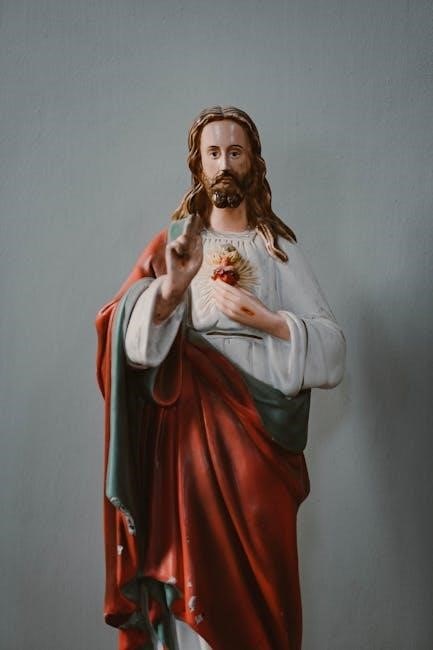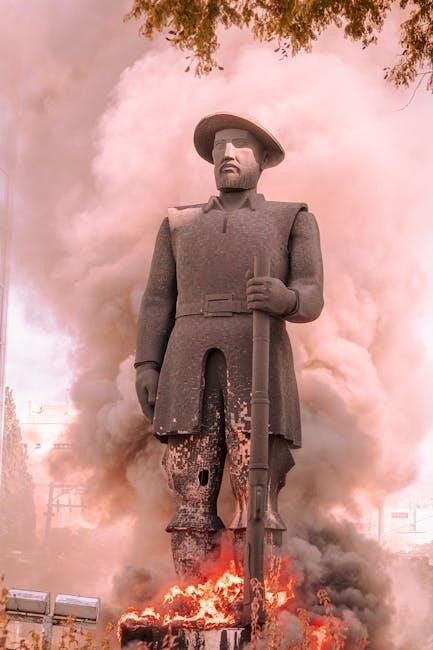KULT: Divinity Lost is a reboot of the 1991 cult classic, offering a modern take on horror RPGs. Published by Helmgast AB and Modiphius Entertainment, this 4th edition blends psychological terror with a rich, dark setting. Players navigate a world where illusions mask reality, and divine forces manipulate humanity. The game features a new rule-set, updated for contemporary themes, and is available in both hardcover and digital PDF formats, making it accessible to new and veteran players alike.
1.1 Overview of the Game
KULT: Divinity Lost is a contemporary horror RPG where players navigate a dark, illusion-shrouded world. Originally released in 1991, this 4th edition reboot offers a fresh rule-set and updated setting. It explores themes of psychological terror, divine manipulation, and the struggle between reality and illusion. Players take on roles like Sleepers or Awakened characters, facing existential horrors and moral dilemmas. The game is available in both hardcover and digital PDF formats, making it accessible to newcomers and veterans of the series.
1.2 Historical Context and Reboot
KULT: Divinity Lost traces its origins to the 1991 RPG Kult, known for its dark, mature themes. The 4th edition, released in 2018, reboots the franchise with a modernized rule-set and updated setting. Published by Helmgast AB and Modiphius Entertainment, it retains the core themes of psychological horror and divine manipulation while enhancing accessibility. This reboot introduces new mechanics and expands the lore, appealing to both veteran players and newcomers drawn to its gritty, contemporary horror narrative.
1.3 Key Themes and Genre
KULT: Divinity Lost delves into psychological and body horror, exploring themes of trauma, madness, and divine corruption. Players confront a world where illusions obscure reality, and ancient, malevolent forces manipulate humanity. The game emphasizes character-driven narratives, moral ambiguity, and the blurred lines between sanity and insanity; Its dark, contemporary setting immerses players in a gritty, urban horror experience, making it a standout title in the horror RPG genre.
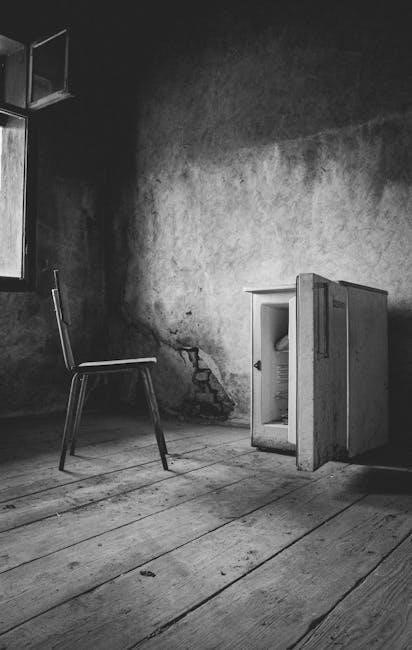
Setting and Worldbuilding
KULT: Divinity Lost unfolds in a dark, contemporary world where fallen angels, demons, and lost gods hide in plain sight. The setting blends modern urban environments with supernatural elements, creating a gritty, immersive atmosphere where illusions mask the true horrors lurking beneath the surface.
2.1 The Dark Contemporary World
KULT: Divinity Lost is set in a bleak, modern world where the sun has metaphorically set, plunging humanity into darkness. The game’s setting is a twisted reflection of our reality, where supernatural forces lurk in the shadows. Players navigate a gritty, urban environment filled with hidden horrors, blending psychological dread with cosmic terror. The world is layered with illusions, masking the true nature of reality, and forcing characters to confront the darkness both within and around them. This immersive atmosphere creates a chilling backdrop for stories of survival and descent into madness.
2.2 Fallen Angels, Demons, and Lost Gods
KULT: Divinity Lost introduces a pantheon of malevolent entities, including fallen angels, demons, and forgotten deities, all vying for power in the mortal world. These beings manipulate reality, feeding on human suffering and fear. Players must navigate a world where divine corruption seeps into everyday life, blurring the lines between sanity and madness. The presence of these supernatural forces amplifies the game’s horror elements, creating a tense, unpredictable environment where characters are both hunters and prey in a divine struggle for dominance.
2.3 The Role of Illusions in the World
In KULT: Divinity Lost, illusions are a fundamental aspect of reality, masking the true, darker nature of the world. These deceptions, created by powerful entities, maintain a false sense of normalcy. Players must navigate a reality where the veil between truth and illusion is constantly blurred. This mechanic enhances the psychological horror, as characters often question what is real and what is fabricated. The struggle to uncover the truth becomes a central theme, adding depth and tension to the narrative and gameplay experience.
Core Gameplay Mechanics
KULT: Divinity Lost introduces a new rule-set focused on immersive storytelling and psychological horror. The system emphasizes character creation, archetypes, and mechanics like Death and Trauma, enhancing the dark narrative experience.
3.1 The New Rule-Set and System
The 4th edition of KULT: Divinity Lost features a completely overhauled rule-set designed to enhance storytelling and immersion. The system emphasizes psychological horror and character development, with mechanics that focus on the blurred lines between reality and illusion. Players navigate a dark, contemporary world where divine forces manipulate humanity, and the threat of madness and trauma is ever-present. The new rules are detailed in the Core Rulebook, available in both hardcover and digital PDF formats, ensuring accessibility for both new and veteran players. The game’s mechanics are tailored to create a gripping narrative experience, making it a standout in the horror RPG genre.
3.2 Character Creation and Archetypes
Character creation in KULT: Divinity Lost offers deep customization, allowing players to craft unique characters with distinct backgrounds and motivations. The game introduces archetypes such as the Detective, Cursed, and Visionary, each with unique abilities and starting advantages. Players can choose to play as Sleepers, unaware of the hidden world, or as the Awakened, who grasp the horrifying truth. The system emphasizes psychological traits and the risk of madness, making characters vulnerable yet dynamic. This approach ensures a personal and immersive narrative experience tailored to each player’s choices and growth.
3.3 Death and Trauma Mechanics
Character creation in KULT: Divinity Lost offers deep customization, allowing players to craft unique characters with distinct backgrounds and motivations. The game introduces archetypes such as the Detective, Cursed, and Visionary, each with unique abilities and starting advantages. Players can choose to play as Sleepers, unaware of the hidden world, or as the Awakened, who grasp the horrifying truth. The system emphasizes psychological traits and the risk of madness, making characters vulnerable yet dynamic. This approach ensures a personal and immersive narrative experience tailored to each player’s choices and growth.
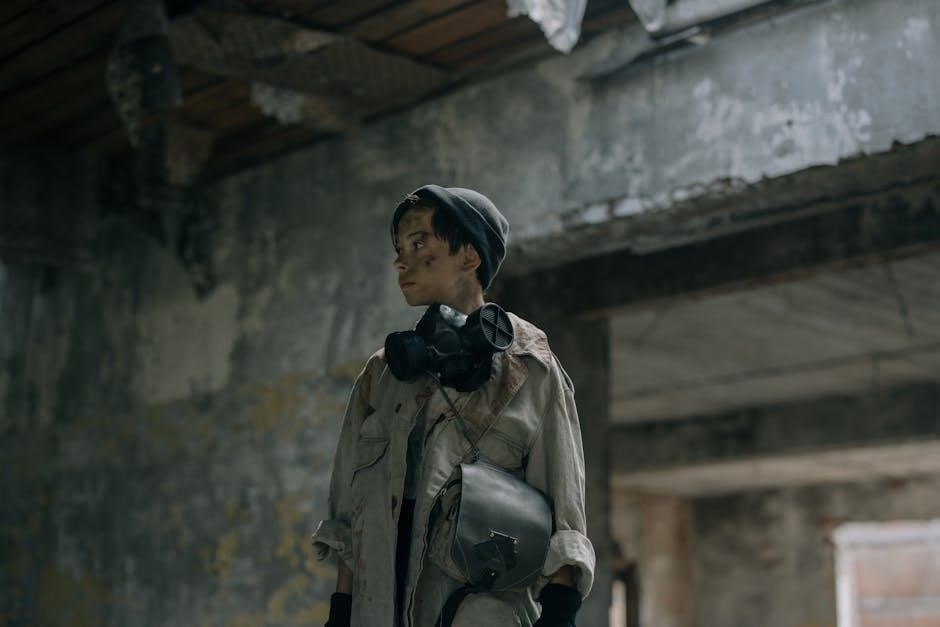
Key Features of the Game
KULT: Divinity Lost offers a chilling narrative focused on psychological horror, divine corruption, and the struggle between illusion and reality. Players explore themes of trauma, madness, and the pursuit of divinity, with mechanics emphasizing character psychology and moral decay; The game also introduces a unique death system, where death is not an end but a transformative experience, deepening the story and its horrors. This creates a gripping, immersive experience for players.

4.1 The Path to Divinity and Its Consequences
The journey to divinity in KULT: Divinity Lost is a perilous and isolating path, where characters must confront their deepest fears and desires. Players face moral dilemmas, committing acts that sever social bonds and embrace primal instincts. The pursuit of godhood comes at a cost, transforming characters into beings both powerful and inhuman. This journey explores themes of sacrifice, corruption, and the loss of humanity, creating a narrative rich in psychological depth and existential horror.
4.2 Psychological and Body Horror Elements
KULT: Divinity Lost delves deeply into psychological and body horror, exploring themes of mental anguish, physical mutilation, and existential dread. The game’s setting, where illusions mask a grim reality, amplifies these horrors. Players confront explicit content, including violence, abuse, and sexual assault, creating a visceral experience. The horror elements are integral to the narrative, forcing characters to grapple with their own mortality and sanity, making the game a chilling exploration of humanity’s darker aspects.
4.3 The Role of the Gamemaster
The Gamemaster in KULT: Divinity Lost acts as the architect of horror, guiding players through a dark, immersive world. They craft narratives, control NPCs, and maintain the eerie atmosphere, ensuring players experience psychological and body horror. The GM’s role is pivotal in balancing story and mechanics, while keeping the game’s tone consistent. With tools like the Gamemaster Screen and scenario PDFs, they orchestrate the descent into madness, making each session a unique, terrifying journey for the players.
Available Resources and Supplements
The game offers a Core Rulebook in both hardcover and PDF, along with supplements like Gallery of Souls and Divided We Run, providing diverse scenarios and tools for enhanced gameplay.
5.1 Core Rulebook and Digital PDF Version
The Core Rulebook for KULT: Divinity Lost is a comprehensive 384-page guide, available in both hardcover and digital PDF formats. The PDF version is accessible via a unique code included in the physical book, ensuring players can easily reference rules and setting details. This edition introduces a new rule-set and updates the game’s dark, contemporary world, blending psychological horror with immersive storytelling. The digital version enhances portability, allowing players and GMs to access the game’s mechanics, character creation, and world-building content effortlessly across devices.
5.2 Gallery of Souls and Other Scenarios
Gallery of Souls is a free PDF scenario for KULT: Divinity Lost, offering a chilling introduction to the game’s dark world. Designed for 2-4 players, it explores themes of fear, isolation, and supernatural intrigue. This starter scenario provides a gripping narrative for new players to experience the game’s psychological horror elements. Additional scenarios like Divided We Run and Deep Dark Net expand the gameplay, each delivering unique mysteries and terrifying encounters that deepen immersion in the KULT universe.
5.3 Divided We Run Starter Scenario
Divided We Run is a gripping starter scenario for KULT: Divinity Lost, designed for 2-4 players. Set in the pitch-dark night, the story follows a desperate fugitive fleeing an unknown threat in a failing car, accompanied by an injured person or hostage. This scenario introduces players to the game’s eerie atmosphere and psychological horror elements. Available as a free PDF, it serves as an excellent introduction to the dark, suspenseful world of KULT, perfect for new players exploring the game’s terrifying narrative;
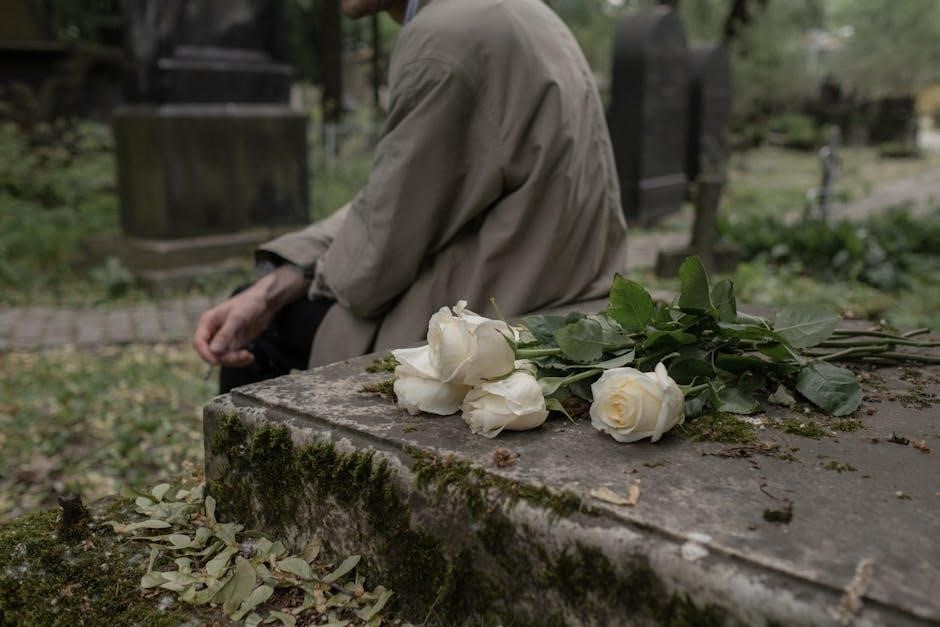
Community and Fan Contributions
The KULT: Divinity Lost community actively creates and shares content, enhancing the game experience. Fan-made resources include scenarios, fillable PDF character sheets, and custom rules, fostering creativity and collaboration among players.
- Fan-made scenarios expand gameplay options.
- Fillable PDF character sheets simplify character creation.
- Community-driven content enriches the game world.
6.1 Fan-Made Scenarios and Resources
Fans of KULT: Divinity Lost have created a wealth of custom content, including scenarios and resources. These offerings expand the game’s possibilities, introducing new themes and challenges. Notable examples include Gallery of Souls, a free PDF scenario, and Divided We Run, a starter scenario for 2-4 players; Additionally, community-driven projects like Screams and Whispers, a scenario collection, and 100 Dark Scenes provide players with diverse and immersive experiences. These resources are often available for download, fostering creativity and engagement within the community.
- Scenarios like Gallery of Souls and Divided We Run offer unique storytelling opportunities.
- Fan-made content explores themes of psychological horror and moral dilemmas.
- Resources are widely available, including free PDF downloads and community-driven projects.
Players can easily access these resources online, enhancing their gameplay experience.
6.2 Fillable PDF Character Sheets
Fans and creators have developed fillable PDF character sheets for KULT: Divinity Lost, enhancing player convenience. These sheets streamline character creation, allowing players to customize archetypes, track stats, and organize gear efficiently. Many sheets are available online, including official and fan-made versions; One notable example is a fillable PDF created by Jarosław Wychodek, offering a user-friendly design. These resources are easily downloadable and compatible with digital platforms, making character management seamless for both new and experienced players.
- Fillable PDFs simplify character creation and management.
- Sheets are available from both official and community sources.
- They support customization and organization of character details.
These tools enhance gameplay preparation and accessibility.
6.3 Community-Driven Content
The KULT: Divinity Lost community actively contributes to the game’s growth through fan-made content. Players and enthusiasts create scenarios, character sheets, and additional resources, often shared as free PDFs. These include unique scenarios like Gallery of Souls and 100 Dark Scenes, as well as custom character sheets and tarot card rules. Such contributions enrich the game, offering diverse storytelling opportunities and tools for players and GMs alike. The community’s creativity extends the game’s replayability and depth.
These resources are widely available online, fostering engagement and innovation within the fan base.
Reception and Reviews
KULT: Divinity Lost has received widespread critical acclaim for its immersive storytelling and deep horror elements. Players praise its unique setting and psychological depth, while critics highlight its modernized rule-set and engaging gameplay mechanics. The game’s ability to blend horror with philosophical themes has resonated with fans, making it a standout title in the RPG community. Its digital PDF version has also been well-received for its accessibility and comprehensive content.
7.1 Critical Acclaim and Player Feedback
KULT: Divinity Lost has garnered significant critical acclaim for its dark, immersive storytelling and psychological depth. Players and reviewers praise its modernized rule-set, which enhances gameplay while maintaining the eerie atmosphere. The PDF version is particularly lauded for its accessibility and comprehensive content. Many highlight the game’s ability to intertwine horror with philosophical themes, creating a unique experience. Fans appreciate its updated setting and the way it balances terror with narrative richness, solidifying its reputation as a standout horror RPG.
7.2 Comparison with Previous Editions
KULT: Divinity Lost stands out as a refined evolution of its predecessors, modernizing the 1991 original. The 4th edition introduces a sleeker rule-set, enhancing gameplay fluidity while preserving the dark, atmospheric core. Fans of earlier versions appreciate the updated setting, which aligns with contemporary themes without losing the iconic horror elements. The PDF format offers improved accessibility, and its streamlined mechanics have been praised for making the game more approachable. This edition successfully bridges nostalgia with innovation, appealing to both veteran players and newcomers seeking a fresh experience.
7.3 Awards and Nominations
KULT: Divinity Lost has garnered significant acclaim, earning nominations for its innovative horror mechanics and immersive storytelling. The game’s 4th edition has been praised for its modernized rule-set and dark, atmospheric design. While specific awards are not listed, its impact on the RPG community and loyal fanbase highlight its recognition as a standout title in the horror genre. Its PDF availability has further boosted its accessibility, solidifying its reputation as a must-play for fans of psychological and body horror.
Digital Tools and Accessories
The KULT: Divinity Lost Core Rulebook is available as a digital PDF, complemented by Foundry VTT support for virtual play. Additional accessories include a reference deck and tarot card rules, enhancing the gaming experience.
8.1 Foundry VTT Support
KULT: Divinity Lost offers comprehensive support for Foundry VTT, enabling virtual tabletop play. This digital integration includes rule and mechanic automation, character creation tools, and pre-loaded assets. Players and GMs can access the Core Rulebook content, reference deck, and tarot card rules directly within the platform. The system streamlines gameplay, allowing seamless online sessions. Additionally, the Reference Deck and tarot card rules are available as downloadable PDFs, enhancing both digital and physical play experiences.
8.2 Reference Deck and Weapon Cards
The Reference Deck for KULT: Divinity Lost includes 55 cards detailing weaponry, gear, and core game mechanics. These cards provide quick access to essential rules, enhancing gameplay efficiency. Weapon cards outline stats and descriptions, while other cards cover basic moves and equipment. Available as a digital PDF, the deck is a valuable resource for both players and GMs, ensuring seamless reference during sessions. This tool complements the game’s dark, immersive atmosphere, keeping players focused on the horror and intrigue of the story.
8.3 Tarot Card Rules and Postcards
Tarot Card Rules in KULT: Divinity Lost add depth to the game’s narrative, using tarot as a mechanic for guiding the story or revealing cryptic truths. Players can draw cards to influence outcomes, creating dynamic and unpredictable scenarios. Additionally, Kult-themed postcards are available as digital downloads, featuring eerie artwork that enhances the game’s atmosphere. These postcards can be used as handouts or inspiration for GMs, further immersing players in the dark, mysterious world of the game.
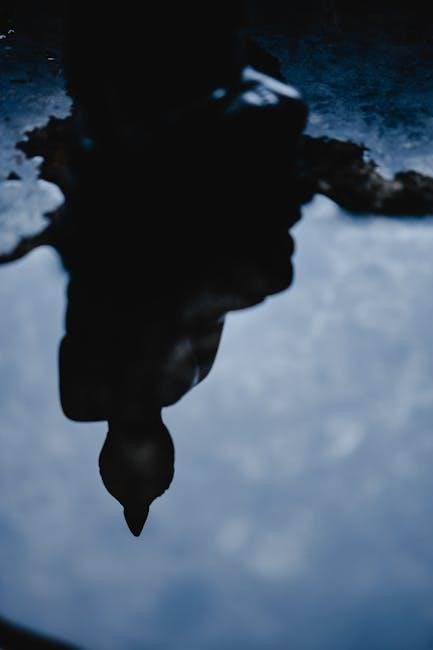
The Future of KULT: Divinity Lost
KULT: Divinity Lost continues to expand with new content. A Kickstarter campaign until July 2nd offers exclusive sourcebooks and tools. A pledge secures PDF access to upcoming releases, ensuring the game’s legacy endures with fresh stories and mechanics.
9.1 Upcoming Expansions and Modules
Exciting expansions for KULT: Divinity Lost are on the horizon, including a pocket-sized Bible Edition and new modules. The Kickstarter campaign offers exclusive content, such as sourcebooks and tools, with a pledge securing PDF access. Upcoming releases include Together Unto Death, a standalone scenario, and a Taroticum And Other Tales module. These expansions promise to deepen the game’s horror elements, introduce new characters, and explore terrifying settings, ensuring the game remains fresh and immersive for players.
9.2 Kickstarter Campaigns and Funding
A live Kickstarter campaign for KULT: Divinity Lost is currently active until July 2nd. Backers can secure PDF copies of upcoming sourcebooks and tools with a pledge of $35, ensuring early access to exclusive content. The campaign has already gained significant traction, highlighting the community’s enthusiasm for the game. Stretch goals and bonus rewards, such as additional scenarios and digital assets, are being unlocked, further enhancing the value for supporters. This funding model underscores the game’s dedicated fanbase and its potential for future growth.
9.4 Plans for New Editions and Reprints
KULT: Divinity Lost is seeing a re-release in a pocket-sized Bible Edition, a condensed version of the core rulebook. This smaller format aims to make the game more accessible while retaining its deep horror elements. Additionally, plans for new editions and reprints are underway, focusing on updating content and improving accessibility. The publisher has also hinted at special anniversary editions, celebrating the game’s legacy. These reprints and new editions ensure the game remains fresh and engaging for both new and veteran players.
KULT: Divinity Lost remains a groundbreaking horror RPG, blending psychological terror with a dark, immersive world. Its unique mechanics and themes continue to captivate players, solidifying its legacy as a modern classic in the genre.
10.1 Final Thoughts on the Game
KULT: Divinity Lost offers a profound and unsettling experience, masterfully blending psychological and body horror elements; Its innovative mechanics and dark narrative provide a vivid, immersive world where players confront the unknown. The game’s exploration of themes like trauma, divinity, and illusion sets it apart, appealing to fans of mature storytelling. With its robust core rulebook and supplementary resources, it remains a standout title in modern tabletop RPGs, leaving a lasting impact on players and the genre alike.
10.2 Its Impact on the RPG Community
KULT: Divinity Lost has left a significant mark on the RPG community, revitalizing interest in horror-themed games. Its dark, mature narrative and innovative mechanics have inspired players and designers alike, setting a new standard for psychological horror in tabletop RPGs. The game’s success has also driven community engagement, with fans creating custom content and scenarios, further expanding its reach. Its influence is evident in modern RPG design, solidifying its place as a landmark game in the genre.
